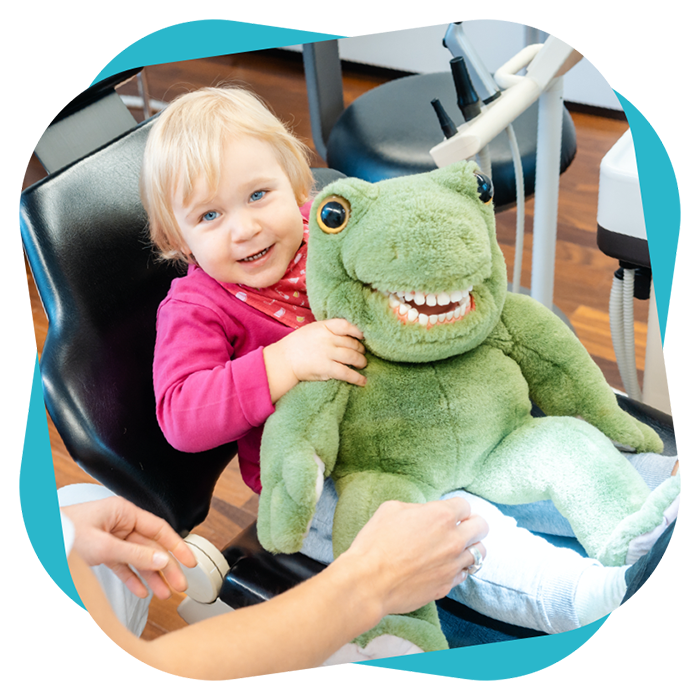FAQ

When should my child first visit the dentist?
Your child should start seeing the dentist by the time their first tooth erupts, or by their first birthday. This is the best way to ensure that their teeth are developing and erupting properly, and provide them with the proper care.
What makes a pediatric dentist different from general dentists?
Pediatric dentists ensure that every element of their practice is geared toward young patients. This creates an atmosphere that is more comfortable (and even fun!) for children. Instead of viewing the dentist’s office as a scary place, they can enjoy their visits and feel good about keeping their teeth healthy and strong. Our entire office and our dental tools are kid-friendly, and our explanations of oral hygiene, oral health and common dental problems are geared toward kids’ understanding.
Dr. Hester has received advanced training in the treatment of children. He is an expert in children’s dental needs and concerns and is able to provide stellar pediatric care.
When do teeth typically develop?
- Teeth begin developing in utero
- Every baby is different, but most experience their primary teeth erupting (coming in) between 6-12 months
- Most of the primary teeth will have erupted by 33 months
- Teeth typically begin erupting in the middle of the lower jaw, followed by the 4 upper incisors
- There are a total of 20 primary teeth
- Tooth development can vary significantly, so don’t be concerned if your child isn’t right on schedule – ask Dr. Hester if you’re noticing significant delays
When will my child lose their first baby tooth?
The primary teeth usually begin to loosen around 6 years old. This can be delayed by up to a year, so don’t worry if your 6-year-old doesn’t have a loose tooth yet. The first teeth to fall out are usually the two bottom front teeth and two top front teeth.
What will my child’s first dental appointment be like?
The steps of your child’s exam will vary depending on their age range.
EXAMS FOR PATIENTS BETWEEN 6 MONTHS TO 1 YEAR OLD
Dr. Hester will either ask that you hold your child on your lap during their exam, or will place your child on an exam table or chair. During the exam, our team will:
- Evaluate your child’s dental health, how their diet and habits affect their teeth, and any potential for cavities
- Remove any stains or plaque from teeth with a wet toothbrush or cloth
- Show how to properly clean your child’s teeth and answer any questions about their oral hygiene
- Identify how much fluoride your child is getting and apply a topical fluoride treatment or provide a supplement if necessary
- Ensure there are no sores or concerning bumps inside the mouth
- Check that the use of a pacifier or thumb sucking aren’t impacting tooth development
EXAMS FOR PATIENTS OVER 1 YEAR OLD
These exam steps will be similar to those of an adult dental exam. The overall goal is to determine oral health and make recommendations related to oral hygiene and diet as needed to prevent cavities.
- Take x-rays to identify cavities and/or tooth/jaw development concerns
- Apply sealants as needed to protect the molars
- Treat cavities
- Identify issues with bite and recommend an orthodontist if necessary
- Talk to you and your child about harmful habits like thumb sucking, clenching or nail biting
- Create a mouth guard if your child plays contact sports
How can I tell whether my child will need braces?
There are many subtle and more obvious signs that point to the need for eventual orthodontic treatment. Dr. Hester will begin getting an idea of your child’s bite and jaw development from their x-rays and their exams. You may also notice that your child is clenching their teeth, accidentally biting the inside of their cheeks, or unable to fit their upper and lower teeth together. If you’re curious about whether braces may be necessary, talk to Dr. Hester and he’ll provide guidance. He will let you know as soon as he has an idea that orthodontic treatment may be necessary for your child.
How can I limit thumb sucking?
Many children stop sucking their thumbs naturally, whether as an infant (usually between 6-7 months) or a toddler (usually between 2-4 years old). Thumb sucking typically doesn’t become a dental problem until permanent teeth are erupting. At this point, the habit can impact your child’s bite and/or palate. The American Academy of Pediatrics recommends intervention for children 5 or older.
If you’re concerned about your child’s thumb sucking, ask about it at your child’s next exam and Dr. Hester will evaluate whether there are any related dental problems and help you broach the topic with your child.
Should my child be getting fluoride?
Fluoride is a naturally-occurring mineral that has been shown to prevent cavities by strengthening tooth enamel. It is added to tap water in many communities (including Collier County), and is also added to many oral hygiene products. Your child is likely already getting fluoride through tap water and we recommend the use of a fluoride toothpaste.
If your child is cavity-prone, they may benefit from fluoride varnish. This is applied to the teeth as an added layer of protection against decay.
If you have any questions or concerns about fluoride, get in touch.
How can I help my child prevent cavities at home?
Your child only visits the office twice a year, so the bulk of their cavity prevention is performed at home. Dr. Hester and our team will provide you with the tools you need to support and encourage your kids as they care for their teeth. Visit our Cavity Prevention page for detailed information on how you can encourage their oral hygiene habits and provide them with a tooth-healthy diet.